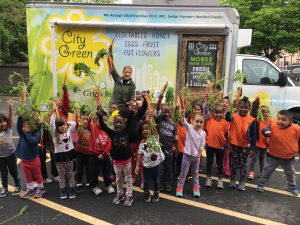Early childhood is the ideal time to establish healthy behaviors, including healthy eating habits. According to the Food and Nutrition Service of the US Department of Agriculture, “Farm to Preschool works to connect early child care and education settings to local food producers with the objectives of serving locally-grown, healthy foods to young children, providing related nutrition education, and improving child nutrition.” The benefits of Farm to Preschool efforts parallel the goals and priorities of the early care and education community including an emphasis on experiential learning opportunities; parent and community engagement; and lifelong health and wellness for children, families and caregivers.
The City Green “Farm to Preschool Program” funded by Partners for Health Foundation was launched in the fall of 2017 at 19 local preschools. Partner sites chose from a variety of program options that included teacher training, garden design/construction, planting lessons and Veggie Mobile Visits.
Teacher trainings are a vital component of the program, providing them with the basics of gardening, time to practice seeding, and learning how to maintain and utilize their school’s garden as a valuable lesson tool. During the two-year pilot program, 162 Preschool teachers received training, 23 gardens were built, and more than 2,300 children between the ages of 3 and 5 were impacted.
The preschools City Green targets to work with are in low-income urban school districts with 80-100% free and reduced meal eligibility. While the ultimate goal is to increase procurement and serving of seasonal, local, and regional foods in school meals, this can only be accomplished by first developing student and administrative awareness of where our food comes from; how local foods contribute to healthy bodies and a healthy environment; and to cultivate an educational community that values and celebrates local healthy foods as part of the greater mission of improving our children’s nutrition and health.


